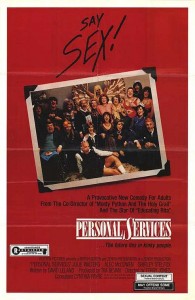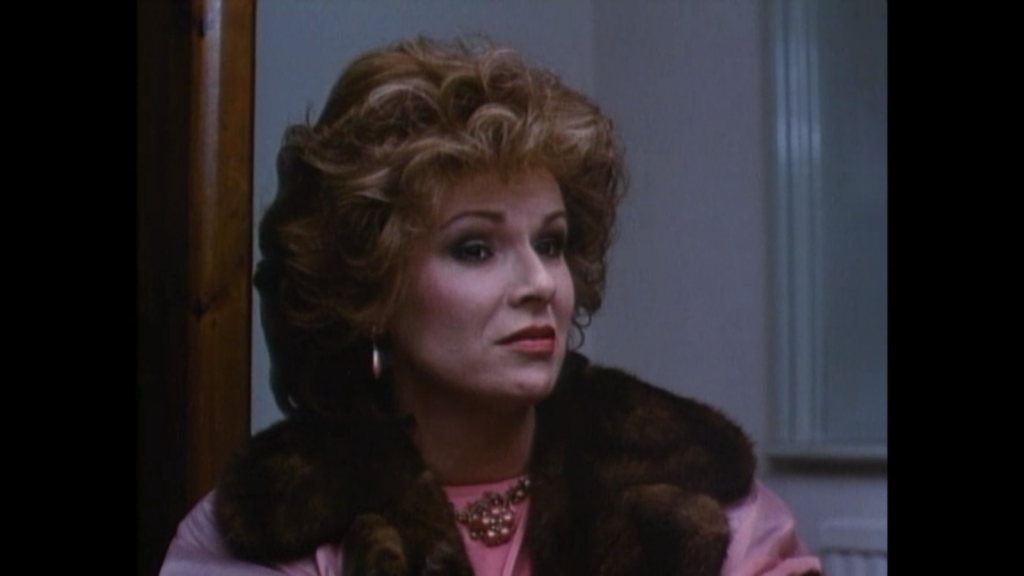“The future lies in kinky people.”
|

Synopsis:
A hardworking British waitress (Julie Walters) begins a new career as a madam, catering to the whims of middle-aged men with kinky sexual fantasies.
|
|
Genres, Themes, Actors, and Directors:
- Morality Police
- Prostitutes and Gigolos
- Strong Females
Review:
Several years after her breakthrough role in Educating Rita (1983), Julie Walters gave another stellar performance in this Terry Jones-directed pseudo-biopic, loosely based on the notorious life story of British “party hostess” Cynthia Payne. Walters immediately convinces us that her “Christine Painter” is a practical, no-nonsense, driven woman who — after only very brief hesitation — finds it pleasantly straightforward to earn a living while orchestrating solutions to men’s secret desires; it’s certainly preferable to a marriage of convenience (her only other obvious way up). The screenplay follows her rise to tenuous success, as she shifts from simply brokering sexual exchanges (and engaging in a few herself) to hosting notoriously gonzo “sex parties” in her house; conflict emerges both in Painter’s troubled relationship with her disapproving father, and her run-ins with Britain’s [morality] police (who are portrayed as unequivocal baddies). Certain scenes — such as Painter’s personal fantasy sequences — feel superfluous and/or poorly handled, but the film as a whole remains true to its intention of presenting Painter/Payne’s story in a sympathetic and lively fashion, and remains worth a look simply for Walters’ strong performance.
Redeeming Qualities and Moments:
- Julie Walters as Christine Painter

Must See?
No, though it’s worth a look simply for Walters’ performance.
Links:
|
One thought on “Personal Services (1987)”
A once-must, as a unique ‘comedy’ – and for Walters’ performance.
Without being a black comedy, this is still a rather dark look at sex – made as light as possible by the very knowing script by David Leland (‘Wish You Were Here’, ‘Mona Lisa’) as well as Jones’ marvelously controlled direction (esp. his guidance to the actors in delivery and timing).
As I was watching (tho I’d seen it before), I was leaning toward a view similar to that of the assessment: that it’s worth a look but not necessarily one to seek out. However, ‘PS’ just gets better as it goes, building through such wild turns (as it effectively reveals the passage of time) that, by its conclusion, it stands out as a singular vision of a world most commonly depicted as base and empty. (I would suspect that much of the reality behind the film was not quite as lighthearted as portrayed but, nevertheless, much of what is shown does seem to ring true.)
Walters’ Cynthia (the film begins and ends with strong emphasis that this is not the actual story of Cynthia Payne) is seen clearly as a woman fed up with not getting a break in life. Or, rather, she starts out on a wrong road – leading to a cul-de-sac – and suddenly becomes very practical about how to take charge inside a losing proposition. At film’s end, she has a wonderful speech about society’s responsibility in terms of her livelihood: that she wouldn’t be in business at all if more (or most) wives were as creative as herself. (~which, for argument’s sake, makes one wonder exactly how kinky married people are supposed to agree to be anyway, but anywho…)
Walters – who is superb throughout – is never better than when she finds herself in sexual situations that she simply finds ludicrous but approaches with gusto. Many of her reactions and responses are priceless. I’m also especially taken with the supporting performances by Shirley Stelfox (as Cynthia’s pal Shirley – she’s quite funny), Danny Schiller (as ‘Dolly’, who constantly denies he’s a man) and Alec McCowen as the business associate/ex-military man (who led 260 overseas missions wearing a bra and panties, as he’s so fond of saying).
This is ultimately a very clever little film – which seems to be something of an overlooked treat.
Fave scene: the three ‘schoolgirls’ (Walters, Stelfox and a man) seductively bunched together as they get excited by a reading of ‘Sex on Lesbos’.